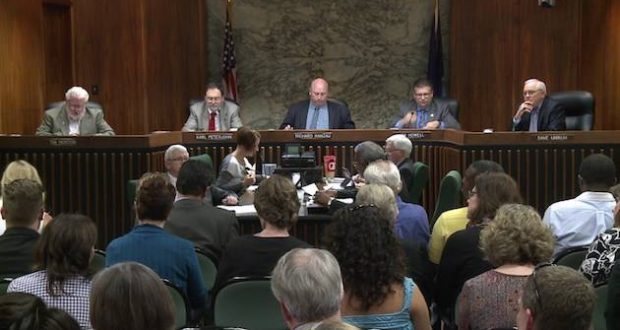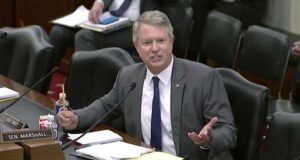Even though a 2014 U.S. Supreme Court ruling said opening governmental meetings in prayer is constitutional, Kansas atheists are again upset.
The target this time? The Sedgwick County Commission which has opened their meetings with prayer for decades. Sedgwick County is home to Wichita, the State’s most populous city.
County commissioners planned to meet with their attorney behind closed doors in the wake of a letter from the Freedom From Religion Foundation. The group, based in Madison, Wisconsin, advocates for the separation of church and state.
Sedgwick County spokeswoman Kate Flavin said that no decision has been made and the group’s request is still under review, adding that the county believes its existing policy strikes the “proper constitutional balance.”
The Wichita Eagle reports that the foundation has accused the county government of violating the Constitution by denying an atheist resident the opportunity to speak during the time the commission.
The Freedom From Religion Foundation hasn’t decided to sue the county over the issue, but it might, its lawyer, Chris Line, said.
A county policy against giving atheists a chance to deliver the invocation is unconstitutional, he said, contending it is discriminatory because it limits the opportunity to deliver the invocation to religious leaders or clergy members of a religious group with an established presence in Sedgwick County.
For decades, the county has invited local religious leaders to open commission meetings with prayer, a practice that was largely uncontroversial until last year. That’s when activists opposed to a proposed chicken processing plant started regularly attending meetings and questioned it.
The foundation became involved after the county denied a request from a county resident who is an atheist to give the meeting invocation.
Supreme Court Rules Prayers are Constitutional
The Supreme Court in 2014 upheld the centuries-old tradition of offering prayers to open government meetings, even if the prayers are overwhelmingly Christian and citizens are encouraged to participate.
The 5-4 ruling was based in large part on the history of legislative prayer dating back to the Framers of the Constitution.
Defending a practice used by the town of Greece, N.Y., the majority ruled that opening local government meetings with sectarian prayers doesn’t violate the Establishment Clause. But it was as long as no religion was advanced or disparaged, and residents were not coerced.
The alternatives, the conservative justices said, would be worse: having government officials and courts “act as supervisors and censors of religious speech,” or declaring all such prayers unconstitutional.
“As a practice that has long endured, legislative prayer has become part of our heritage and tradition, part of our expressive idiom, similar to the Pledge of Allegiance, inaugural prayer, or the recitation of ‘God save the United States and this honorable court’ at the opening of this court’s sessions,” Justice Anthony Kennedy wrote.
County Manager Michael Scholes said commissioners will have a closed session this week to consult with attorneys on the prayer issue.
 Metro Voice News Celebrating Faith, Family & Community
Metro Voice News Celebrating Faith, Family & Community 








